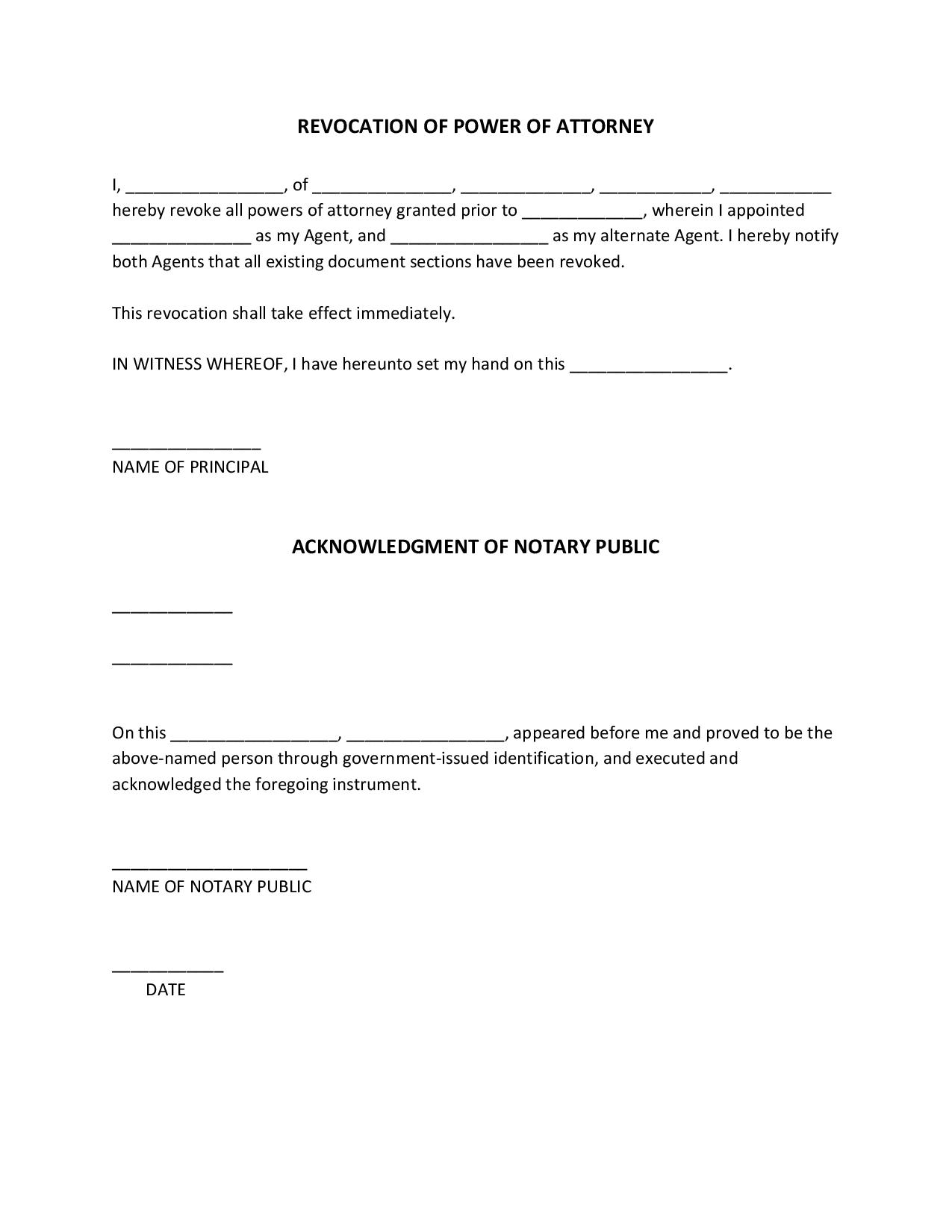- Eviction Notice Forms
- Power of Attorney Forms Forms
- Bill of Sale (Purchase Agreement) Forms
- Lease Agreement Forms
- Rental Application Forms
- Living Will Forms Forms
- Recommendation Letters Forms
- Resignation Letters Forms
- Release of Liability Agreement Forms
- Promissory Note Forms
- LLC Operating Agreement Forms
- Deed of Sale Forms
- Consent Form Forms
- Support Affidavit Forms
- Paternity Affidavit Forms
- Marital Affidavit Forms
- Financial Affidavit Forms
- Residential Affidavit Forms
- Affidavit of Identity Forms
- Affidavit of Title Forms
- Employment Affidavit Forms
- Affidavit of Loss Forms
- Gift Affidavit Forms
- Small Estate Affidavit Forms
- Service Affidavit Forms
- Heirship Affidavit Forms
- Survivorship Affidavit Forms
- Desistance Affidavit Forms
- Discrepancy Affidavit Forms
- Guardianship Affidavit Forms
- Undertaking Affidavit Forms
- General Affidavit Forms
- Affidavit of Death Forms
Revocation of Power of Attorney
Powers of attorney exist primarily for security in case of the principal’s incapacity. It grants a legal authority to the agent to act on the principal’s behalf because of a particular incapacity. But, when the time comes that the agent’s help is no longer needed, you will need a legal document to cancel the powers that were initially granted. That is where the revocation of power of attorney form will come in. Continue reading below to find out more about this document. Read More
Revocation of Power of Attorney
What Is a Revocation of Power of Attorney Form?
A revocation of power of attorney form is a legal document used to cancel the powers granted to the agent by the principal. There are various reasons for the cancellations of such powers. The agent has become untrustworthy, or he cannot fulfill the responsibility anymore. It can also be that the initial power of attorney is no longer needed or necessary. Or a replacement for the current agent has been found, or the purpose has been fulfilled.
How to Create a Revocation of Power of Attorney Form?
Once you feel that things are not working in your favor anymore, consult with your lawyer first before making any decision. A power of attorney precedes this form.
This form shall only be effective if it is recorded with the same government office where you document the other power of attorney. The agent should also be sent a notice regarding the revocation of a power of attorney.
We have compiled tips for you on how to create your revocation of power of attorney form. Read them below.
1. Download and Use a Template
You always have the choice to make your form from scratch. Like all other forms, it’s best to use and download a template to minimize the probability of errors. These downloadable forms are catered to fit the State you belong to. The blank fields in the form serve as your guided access when filling out the form.
2. Identify Both Parties
Both parties should still be identified even with this form. State your name and mailing address along with the agent’s name and mailing address when revoking a power of attorney. If you have appointed an extra agent, mention them as well. You may also include the date in which the authorities were granted to the agent.
3. Include the Effective Date of Revocation
The effective date of revocation takes effect immediately in most cases. But if you want to set a different date, state it so. You need not provide a reason for your revocation.
4. Sign the Document
Affix your signature after to authenticate the document. The recipient may question the authenticity of the document if it lacks the most critical detail.
5. Notarize the Form
Not all states require the completed form to be notarized, but a notarized document is more effective. Include the State and county in the notary public’s acknowledgment along with the acknowledgment date and the principal’s name. The notary public will then affix their signature and stamp their seals to make official the completed document.
The agent should receive a notice from the principal indicating the revocation of the powers granted. Aside from the agent, the bank and the insurance company or any other third parties involved should also receive a copy of the completed document because the agent may continue transacting with them.
Frequently Asked Questions
What are the grounds for revoking a POA?
A principal can revoke the POA for the following reasons:
1. The law does not consider the agent competent to perform the powers in the POA.
2. The agent has expressed disinterest in performing the powers
3. The POA is no longer necessary.
4. The principal wishes to change the agent, and if the powers in the POA has been accomplished or fulfilled.
Can I change a POA even after I executed it?
Yes. Under a durable power of attorney. But before they provide you the green light to change it, you must have legal, mental capacity, and you must prove this through a doctor’s evaluation. You will then have to undergo a legal protocol once a legal, mental capacity has been proven.
Does a principal’s spouse have a right over POA?
No. The agent is only allowed to act on behalf of the principal and no one else. At the same time, the spouse is not allowed to terminate the POA.
Does a next of kin have a right over POA?
Yes. A next of kin will only have a right over POA if you have a written will appointing them to be the next executor. Aside from a will, proven blood or legal relationship will also allow them to handle your personal and professional matters in the event of your death.
Can you appoint two agents in a POA?
Yes, you can appoint two agents in your POA. However, you should stipulate in the POA if they are to perform individually or jointly. Of course, as agents, they are always expected to get along to get things done harmoniously. But things cannot be fulfilled if your agents do not see eye to eye or are still disagreeing. As much as possible, try to keep the number of your agents to a minimum. Doing so can prevent conflict or issues down the road.
A completed power of attorney is powerful in ways that you already know. You’re giving access to personal records and transactions that only you should know. But when the time comes that the agent has served their purpose well, it is time to revoke those powers. Verbal revocation just doesn’t cut it because your agent may be performing things for their benefit without you knowing. The granting of powers required a written document—therefore, a record is necessary for a revocation. The revocation of power of attorney form will be an essential instrument to revoke those powers. With this document, you will be legally stripping the powers your agent once had.

